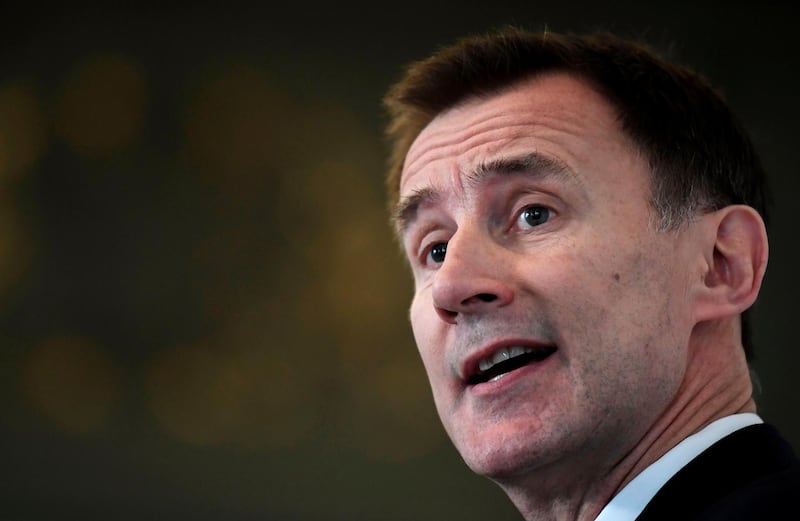Britain's Foreign Secretary Jeremy Hunt arrived in Tehran on Monday for the first time since taking office, Iranian media reported.
Mr Hunt will hold talks with Iranian authorities on issues including the future of the 2015 nuclear deal, Yemen, and the cases of the detained dual nationals.
"He will meet [Iranian Foreign Minister Mohammad Javad] Zarif today and the secretary of Iran's Supreme National Security Council Ali Shamkhani," state TV reported.
In May, US President Donald Trump abandoned a nuclear deal that had been negotiated with five other world powers during president Barack Obama's administration. The US also restored sanctions targeting Iran's oil, banking and transportation sectors this month.
This is the first visit by a western foreign minister since the US withdrew from the deal in May.
_______________
Read more:
Sheikh Mohamed meets John Bolton and Jeremy Hunt — in pictures
Britain’s Theresa May calls on Iran to release jailed Nazanin Zaghari-Ratcliffe
UK warns dual nationals against visiting Iran
_______________
Ahead of his visit, he said the UK remained committed to the nuclear deal but stressed that Tehran must stick to its terms.
“We will stick to our side of the bargain as long as Iran does," Mr Hunt said. "But we also need to see an end to destabilising activity by Iran in the rest of the region if we are going to tackle the root causes of the challenges the region faces.”
Other signatories of the deal, the European Union, France, Germany, Britain, Russia and China, have been searching for ways to salvage the pact.
The EU has been trying to establish a Special Purpose Vehicle (SPV) for non-dollar trade with Iran to save the deal, under which most sanctions were lifted in 2016 in exchange for Tehran curbing its nuclear programme.
The SPV was conceived as a clearing house that could be used to help match Iranian oil and gas exports against purchases of EU goods, circumventing US sanctions based on the global use of the dollar for oil sales.
The EU has tried to have the SPV set up by this month, but no country has offered to host it, six diplomats told Reuters last week.
Meanwhile, Iran on Monday said it is still hopeful that the nuclear deal can be saved.
"There are some ambiguities on implementation of the EU's mechanism to protect trade with Iran from America's sanctions ... But we remain hopeful that the Europeans can save the deal," Bahram Qasemi, a foreign ministry spokesman, told a news conference broadcast live on state TV.
"We expect EU to implement the SPV as soon as possible," Mr Qasemi said. "Iran adheres to its commitments as long as other signatories honour theirs."
Mr Hunt will also discuss Iran's involvement in the war in Yemen and in particular UN reports that Tehran supplied ballistic missiles to the Houthis. The UK foreign office said this was "destabilising and contrary to efforts to diplomatic efforts to end the conflict".
He is expected to raise the case of Nazanin Zaghari-Ratcliffe while pressing for the release of all British-Iranian nationals imprisoned in the country.
Mr Hunt met Mr Zarif in New York in September to discuss Ms Zaghari-Ratcliffe’s plight. The charity worker has been jailed in the country since April 2016 on charges of spying.
Although no exact figures exist, it is thought that more than a dozen dual-nationals are currently languishing in Iranian jails on various charges.
“We must see those innocent British-Iranian dual nationals imprisoned in Iran returned to their families in Britain,” Mr Hunt said.
“I have just heard too many heartbreaking stories from families who have been forced to endure a terrible separation. So I arrive in Iran with a clear message for the country’s leaders - putting innocent people in prison cannot and must not be used as a tool of diplomatic leverage.”






